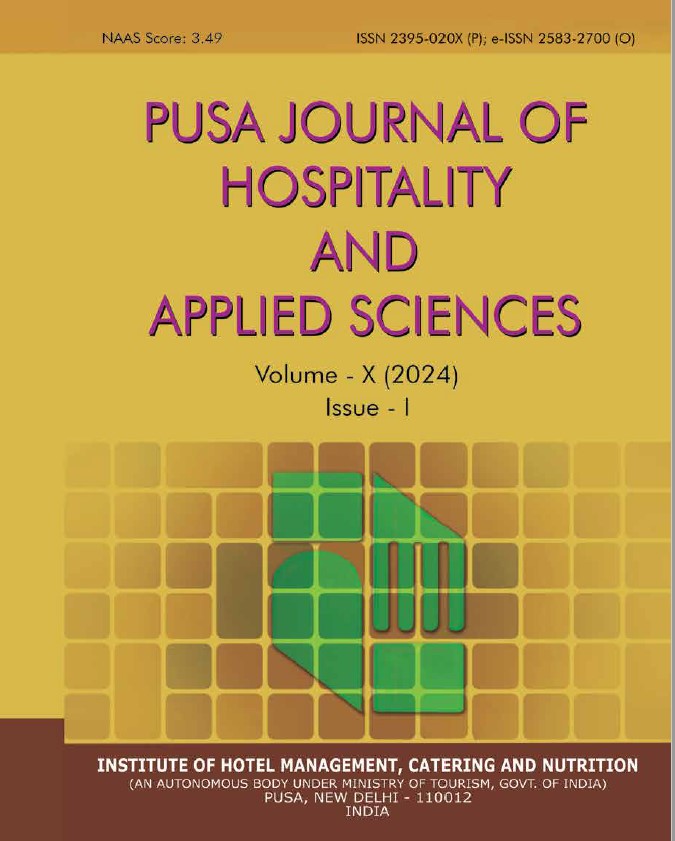Analyzing The Role Of ‘emotional Intelligence’ In Developing Leadership In The Indian Hospitality Sector
Keywords:
Emotional Intelligence, Emotional Quotient, Work-life Balance, HospitalityAbstract
Background: Emotional intelligence has become a buzz word; Emotional Quotient (EQ) has long overtaken the Intelligence Quotient (IQ). A manager capable of recognizing and managing emotions of the self and of others may be more adept at work. Hoteliers have to work long hours due to which staff may become disgruntled and when insufficient returns are received, it may show up in their behaviour at work. The hotel industry is a service oriented industry which has an intangible product to sell, something that is produced and consumed in the same instant. Objectives: To understand in depth, the concept of emotional intelligence in hospitality. To analyze the link between EI and its role in developing effective leaders in hospitality. Methodology: Convenience sampling was used and the samples were approached online due to COVID. The samples were shortlisted from the personal contacts of the authors in Hyderabad’s 5 star hotels holding management level positions. Out of 50-60 samples approached, 43 samples consented for their inclusion. Results: EQ has been ignored in hospitality curriculum with 55% sample base completely agreeing to and same should be for hiring, as voted by all 43 samples. 26 samples were also in complete favor of EI being a necessary pre-requisite for promotions. Conclusion: EI is extremely necessary in leader building and developing EI focused course for the under-graduates will help inculcate the quality in later stages of career.
References
Ashkanasy, N. M. (2003). Emotional awareness and emotional intelligence in leadership teaching. Journal of Education for Business, 79(1), 18–22.
Cavelzani, A., & Esposito, M. (2010). Emotiional Intelligence & Hospitality. Mustang: Tate Publishings & Enterprises.
Dowding, M. (2016). Emotional Intelligence in Leadership.Mindtools. Retrieved July 12, 2020, from https://www.mindtools.com/pages/article/newLDR_45.htm
Editor, E. (2019, June 19). Move Over AI: Emotional Intelligence Is still # 1 in the Hotel Industry. Retrieved March,12, 2020, from Insights: https://insights.ehotelier.com/suppliers/2019/06/19/move-over-ai-emotional intelligence-is-still-1-in-the-hotel-industry/
Goleman, D. (1995). Emotional intelligence. New York: Bantam Books.
Goleman, D., & Boyatzis, R. Difficult Conversations. Havard Business Review.Retrieved July 12, 2020, from https://hbr.org/2017/02/emotional-intelligence has-12-elements-which-do-you-need-to-work-on
Kim, H. J. J., & Agrusab, J. (2011). Hospitality service employees’ coping styles: The role of emotional intelligence, two basic personality traits, and socio demographic factors. International Journal of Hospitality Management , 588-598.
Koc, E. (2019). Introduction to Emotional Intelligence in Tourism & Hospitality. In E. Koc, Emotional Intelligence in Tourism & Hospitality (pp. 1-14). Boston: Cabi.
Rahim, M., Antonioni, D., & Psenicka, C. (2002). A structural equations model of leader power, subordinates' styles of handling conflict, and job performance. International Journal of Conflict Management, 12, , 191–211.
Scott-Halsell, S. A., Blum, S. C., & Huffman, L. (2008). A Study of Emotional Intelligence Levels in Hospitality Industry Professionals. Journal of Human Resources in Hospitality & Tourism , 135-152.




